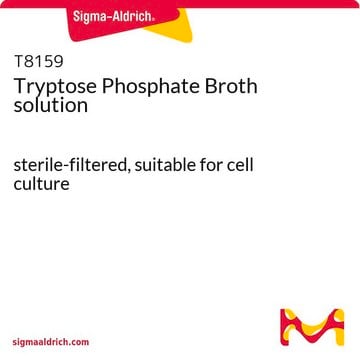T9157
Tryptose Phosphate Broth
suitable for insect cell culture
Sinónimos:
Tryptose Broth
Iniciar sesiónpara Ver la Fijación de precios por contrato y de la organización
About This Item
UNSPSC Code:
41106507
NACRES:
NA.73
Productos recomendados
biological source
bovine milk
Quality Level
form
solid
technique(s)
cell culture | insect: suitable
shipped in
ambient
storage temp.
room temp
General description
Tryptose Phosphate Broth (TPB) comprises pyrimidine based components and is crucial for pyrimidine synthesis and electron transport chain in cells. In chick embryo fibroblast, it alleviates chloramphenicol inhibition.
Application
In addition to its use for the growth of fastidious micro-organisms, Tryptose Phospate Broth (TPB) has been studied as supplement for the preparation of media that supports vaccine production in BHK-21 cells and the growth of SF21 insect cells in high-density perfusion culture stirred-tank bioreactors.
Tryptose Phosphate Broth has been used as a supplement:
- in Eagle′s minimum essential medium alpha for growing Vero cells
- for Vero-CCL81 cells in porcine epidemic diarrhea coronavirus propagation
- in Dulbecco modified Eagle medium in LR7cells for mouse hepatitis virus propagation
- in Glasgow minimum essential medium (GMEM) for Madin-Darby canine kidney (MDCK) cells.
Components
Tryptose Phosphate Broth (TPB) is composed of four components: Tryptose (20g/L); Dextrose (2g/L); NaCl (5g/L) and Disodium Phosphate (2.5g/L) typically adjusted to pH 7.3. The tryptose component is a peptone (mixture of amino acids and short peptides) derived by the mixed enzymatic hydrolysis (pancreatic enzymes) of the milk protein casein. This hydrolysate provides a source of amino acid based nutrients and survival factors that support the growth of fastidious micro-organisms such as Brucella, Streptococcus, and Neisseria; as well as eukaryotic cells such as insect and animal cells. Dextrose provides a fermentable carbohydrate that can be used by fastidious mico-organisms. Sodium chloride maintains the osmotic and ionic equilibrium and disodium phosphate provides the basic buffering capacity.
Comparable product
also commonly purchased with this product
Referencia del producto
Descripción
Precios
Storage Class
11 - Combustible Solids
wgk_germany
WGK 3
flash_point_f
Not applicable
flash_point_c
Not applicable
ppe
Eyeshields, Faceshields, Gloves, type P3 (EN 143) respirator cartridges
Certificados de análisis (COA)
Busque Certificados de análisis (COA) introduciendo el número de lote del producto. Los números de lote se encuentran en la etiqueta del producto después de las palabras «Lot» o «Batch»
¿Ya tiene este producto?
Encuentre la documentación para los productos que ha comprado recientemente en la Biblioteca de documentos.
Los clientes también vieron
Identification and characterization of a proteolytically primed form of the murine coronavirus spike proteins after fusion with the target cell
Wicht O, et al.
Journal of Virology, 88(9), 4943-4952 (2014)
Phytochemical analysis and in-vitro screening of selected Indian medicinal plants for antiviral activity against highly pathogenic avian influenza virus
Sood R, et al.
Spatula DD, 3(3), 81-88 (2013)
Aminopeptidase N is not required for porcine epidemic diarrhea virus cell entry
Li W, et al.
Virus Research, 235, 6-13 (2017)
Azali Azlan et al.
PLoS neglected tropical diseases, 15(1), e0008351-e0008351 (2021-01-23)
The Asian tiger mosquito, Aedes albopictus (Ae. albopictus), is an important vector that transmits arboviruses such as dengue (DENV), Zika (ZIKV) and Chikungunya virus (CHIKV). Long noncoding RNAs (lncRNAs) are known to regulate various biological processes. Knowledge on Ae. albopictus
Tryptose phosphate broth improves Rickettsia felis replication in mammalian cells
Saisongkorh W, et al.
FEMS Immunology and Medical Microbiology, 64(1), 111-114 (2012)
Nuestro equipo de científicos tiene experiencia en todas las áreas de investigación: Ciencias de la vida, Ciencia de los materiales, Síntesis química, Cromatografía, Analítica y muchas otras.
Póngase en contacto con el Servicio técnico















